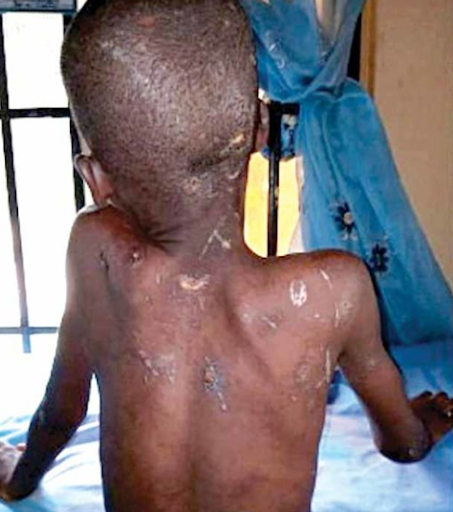Nigerian Children Used As ‘House Helps’ Face Life Of Abuse
Hundreds of underage children who work as domestic help in different parts of Nigeria are faced with hardship. Some of them are trafficked and molested despite the provisions of the Child's Rights Act.

From his narration, John Akinkunmi (not real name) was trafficked from Kaduna State, Northwest Nigeria to work as a house help at Ilorin, capital of Kwara State, in the North-central region of the country.
After spending some time in Ilorin, he moved to the Southwest, at Adebowale area in Akure, Ondo State, with a middle-aged woman, Opeyemi Omoyemi, who used him as a house help. The 10-year-old boy said his boss usually feeds him once daily and as a result, he steals from the kitchen.
Social media network, Twitter, went agog on Sunday, Feb. 6, 2022 after the young boy was caught stealing meat from his boss’ pot. His boss, Omoyemi, used a razor blade to inflict deep cuts on the minor’s body.
According to the video seen by HumAngle, there were over 10 different slashes on the victim’s body, causing him to lose pints of blood. The viral video of the incident got the attention of the wife of the state’s governor, Betty Anyawu-Akeredolu, and other rights activists who facilitated the arrest of Omoyemi.
While the woman was apprehended for her ugly actions, the abused child was taken to hospital for medical care. The state’s police spokesperson, Funmilayo Odunlami, said “so far, her claim is that the small boy stole meat from her pot of soup.”
HumAngle learnt that Omoyemi was arraigned before an Akure Magistrate court, on Feb. 7, 2022, on a five-count charge bothering on child abuse, attempted murder, violence against person, among others.
The Magistrate handling the matter, O. A. Edwin said in her ruling that the defendant was guilty of child abuse and violence against person but argued that she does not have jurisdiction to hear the count that deals with attempted murder.
Meanwhile, the defendant has been asked to be kept in police custody till next adjournment day which is Feb. 14, 2022.
House help menace in Nigeria
Nigerian children have long been experiencing various forms of child labour. While some are engaged in traffic hawking, many work as house helps in various parts of the country. They are usually moved from their parents or guardians’ home to live with outsiders who engage them for different services which include domestic cleaning, tending cattle, sales boys/girls, and looking after the children of their bosses.
There have, however, been various reports on how these children are poorly treated with little or no remuneration. In cases where they are unable to meet their basic tasks, they are subjected to verbal and physical assaults.

Human rights activists who have handled various cases of child molestation told HumAngle that parents are sometimes promised that their children would be put in school but the reverse is always the case.
Findings revealed that most of the children used as house helps are recruited from rural areas within Nigeria or from neighbouring countries through agents or family members.
The agents, HumAngle learnt, often serve as guarantors or buffer between employers and the children. While payments are sometimes made to parents, guarantors are mostly the receivers when the children’s parents are far away.
Children face life of abuse
Aside from Akinkunmi who was recently abused, many others suffer in silence. Luckily for some children, their stories make it to social media. For instance, a woman identified as Nmesoma Okoye was arrested on March 11, 2021 after beating a 10-year-old maid to death in Anambra, Southeast Nigeria.
In a report published on April 23, 2018, a 12-year-old house help in Anambra had her intestine ruptured and was also tortured in her privates by Nkechi Bartholomew whom she worked with. Nkechi inserted sticks into Faith’s private parts and turned them over several times. In the process, her reproductive systems were ruptured leaving Faith needing multiple surgeries.
In another related incident, Nene Fortune Stephens was arrested in Lagos on April 23, 2020 for torturing her maid to death over a dispute about salary arrears and stealing of noodles.
On June 16, 2018, police arrested Yetunde Bello for torturing her 10-year-old house help with a hot iron for damaging the knob of a tap on the premises of her residence in the Iyana Ipaja area of Lagos.
For not washing a kettle properly, a woman identified as Gloria blinded a 12-year-old boy in one eye. The issue occurred at Ikeja, Lagos on July 7, 2016. In another report published July 14, 2020, a house help whose family members were displaced by terrorists was molested and hospitalised in Kaduna.
What the laws say
The Nigerian Labour Decree of 1974 defines a child as anybody below 15 years of age. More so, section 28 of the Child’s Rights Act adopted in Nigeria in 2003 prohibits exploitative labour of children.
The law states that “no child shall be – (a) subjected to any forced or exploitative labour; or (b) employed to work in any capacity except where he is employed by a member of his family on light work of an agricultural, horticultural or domestic character; or (c) required, in any case, to lift, carry or move anything so heavy as to be likely to adversely affect his physical, mental, spiritual, moral or social development; or (d) employed as a domestic help outside his own home or family environment.”
It further states that any person who contravenes any provision of the law “commits an offence and is liable on conviction to a fine not exceeding fifty thousand naira or imprisonment for a term of five years or to both such fine and imprisonment.
“Where an offence under this section is committed by a corporate body, any person who at the time of the commission of the offence was a proprietor, director, general manager or other similar officer, servant or agent of the corporate body shall be deemed to have jointly and severally committed the offence and may be liable on conviction to a fine of two hundred and fifty thousand naira.”
In addition, section 11 of the act notes that “no child shall be‐ (a) subjected to physical, mental or emotional injury, abuse, neglect or maltreatment, including sexual abuse; (b) subjected to torture, inhuman or degrading treatment or punishment; (c) subjected to attacks upon his honor or reputation; or (d) held in slavery or servitude, while in the care of a parent, legal guardian or school authority or any other person or authority having the care of the child.”
The founder of Advocate for Children and Vulnerable Persons Network (ACVPN), Ebenezer Omejalile, told HumAngle, that to eradicate the abuse of children, the government must ensure proper implementation of Child’s Rights Act and ensure violators face necessary legal actions.
Support Our Journalism
There are millions of ordinary people affected by conflict in Africa whose stories are missing in the mainstream media. HumAngle is determined to tell those challenging and under-reported stories, hoping that the people impacted by these conflicts will find the safety and security they deserve.
To ensure that we continue to provide public service coverage, we have a small favour to ask you. We want you to be part of our journalistic endeavour by contributing a token to us.
Your donation will further promote a robust, free, and independent media.
Donate HereStay Closer To The Stories That Matter




